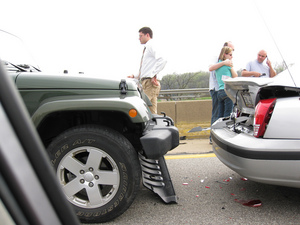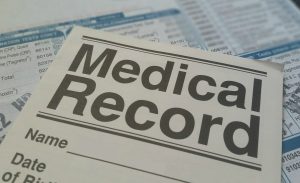How do you know if you really have a personal injury case? For starters, the number one, most important factor in any personal injury case is the extent of your injuries. Without an injury, you commonly will not have a strong personal injury case. One of the biggest factors in any personal injury case is medical bills. You may find it difficult to receive payment for pain or suffering if you do not have medical bills to prove your condition.
Personal Injury Case for Auto Accidents
The basis for any successful auto accident personal injury case is, again, the extent of your injuries. For example, let’s say Bob ran into the back of your car at a red light while he was sending his friend a text. Your car suffered minor damage but you have no injuries. In this example, Bob’s insurance company would be liable for your property damage but not liable for an injury settlement.
In the second example, let’s assume that you were hurt when Bob ran into the back of your car but you did not see a doctor. Even though you might still be in pain, you may not have a strong personal injury case. A good personal injury case needs documentation of your injuries to help support the claim. If you choose to not see a doctor after your car wreck, then you most likely do not have a strong personal injury case.
Negligence
Negligence is the when an individual does not exercise a reasonable standard of care for the safety of others. Moreover, the level of negligence is considered when identifying the at fault party. There are three main types of negligence including Behavioral, Operational and Environmental.
Behavioral Negligence
is a series of decisions that lead to a car accident. Likewise, behavioral negligence also includes substance impairment, which is perhaps the most common form. Alcohol and other drugs cause about one-third of all fatal car accidents in the US every year. Fatigue and/or drowsiness are other common types of behavioral negligence.
Operational Negligence
generally refers to traffic violations or infractions. However, operational negligence also includes distracted behaviors such as talking on the phone, texting, and/or eating while driving. Of course, many operational negligence cases also include excessive speed and/or illegal turns.
Environmental Negligence
is when a driver ignores conditions that warrant special attention. For example, the posted speed limit is meant to be used when conditions are ideal. But we all know that conditions can change depending on fog, darkness, rain, snow, ice, heavy traffic, construction/school zones and many, many more. Environmental negligence commonly involves a noticeable lack of ordinary awareness and care.
Examples of Negligence for Automobile Accidents
Example 1:
Bob was sending a text message and caused an accident, this would be an obvious example of Bob’s negligence. Texting and driving is quickly becoming the most dangerous form of operational negligence. Make sure to talk to your teen drivers about the dangers of texting while driving.
Example 2:
Jane was driving home from work and noticed construction signs indicating road work ahead. Jane gets a call and forgets the quickly approaching construction, causing a rear end collision when traffic slows. This would be an example of Jane failing to identify road conditions.
Example 2:
Proving Negligence in a slip and fall accident might be a little more difficult, and oftentimes requires special attention. For example, Jane is walking down the isle at the grocery store and falls down because there is a broken bottle of olive oil on the floor. The first question most people ask is, was there a wet floor sign out?
If there was a wet floor sign out, Jane should watch were she is walking or pay special attention. Another question might be, who broke the bottle of oil and does the grocery store even know? In this case, if the owner of the property or grocery store doesn’t know that there is oil on the floor, then how can they be negligent? Negligence includes intent, meaning that the store owner knew about the oil spill but did not clean it up or mark the area, putting others at risk of injury.
Personal Injury Cases & Doctors
Injury is the key word in every personal injury case, which is likely where we get the name. If you fail to see a Doctor and do not document your injuries, then you probably do not have a good personal injury claim. The insurance company will watch those first few days closely to see if you are truly injured. Patients who fail to seek treatment after a car accident are most likely not seriously injured, and therefore do not require long-term treatment.
With any accident, delays and/or gaps is treatment can be used against you by the insurance company. They will see this as a sign that you are not truly injured. Again, if you are not injured in an automobile accident, then you cannot expect a large personal injury claim. For this reason, many Injury Attorneys will send you to a variety of Doctors to get as much documentation as possible.
It is never a good idea to delay treatment if you or someone you love have been injured in serious automobile accident. We generally recommend seeking medical care within 72 hours to be safe, but also to prevent additional injuries. Whatever you do, make sure to document your injuries within the PIP deadline if applicable in your state. Otherwise, you could get stuck with the medical bills.
Call today if you have questions about insurance in your state or if you need to schedule with an Accident Doctor. All of our Doctors accept third party billing and specialize in auto accident care.




 Since 2012, Accident Doctor has been dedicated to connecting personal injury patients and attorneys with qualified physicians who specialize in treating accident-related injuries. Our nationwide network includes experienced medical professionals who provide care for individuals involved in car accidents, motorcycle accidents, truck and tractor-trailer collisions, slip and fall incidents, and workers’ compensation cases.
Since 2012, Accident Doctor has been dedicated to connecting personal injury patients and attorneys with qualified physicians who specialize in treating accident-related injuries. Our nationwide network includes experienced medical professionals who provide care for individuals involved in car accidents, motorcycle accidents, truck and tractor-trailer collisions, slip and fall incidents, and workers’ compensation cases.